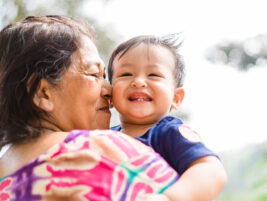This double issue continues the new format for WAIMH Perspectives in Infant Mental Health. With the use of Social Media, WAIMH Central Office staff posts each submission after it has been reviewed and accepted for circulation. Weekly or bi-weekly postings on the WAIMH Face book page call attention to what members around the world are thinking, doing, and writing about. Because we also value tradition, we assemble the articles and, with the help of the Central Office staff, publish them in full issues of Perspectives. We welcome your comments and suggestions regarding this new format.
With his issue, we are pleased to introduce you to the new WAIMH Executive Director (ED), Kaija Puura, MD. Dr. Puura introduces herself to you in the first article of this issue. She brings strength, depth, commitment, and a wonderful sense of humor to the position. Wishing to shine a light on WAIMH members who received awards at the WAIMH Congress for exceptional service to infants, toddlers, and families, we highlight Antoine Guedeney (Rene Spitz Award), Pälvi Kaukonen (Sonya Bemporad Award), Lynn Priddis (WAIMH Award), and Elisabeth Conradt (WAIMH New Investigator Award). The 2018 WAIMH Congress was memorable; we offer reflections from members who travelled to Rome and were eager to share their experiences and offer appreciation to the Italian Association for Infant Mental Health, the host committee and the WAIMH Board for planning the amazing global event.
Three papers are varied and of particular interest. The first is Integrating Infant Mental Health into Primary Care, written by colleagues Kaija Puura, Elmarie Malek, and Astrid Berg from Finland and South Africa who have developed and integrated a basic infant mental health screen for us in a maternal and child health screening tool. The second is Public Policy and Infant Mental Health, contributed by Hiram Fitzgerald and Deborah Weatherston from Michigan, which expands on the WAIMH Policy Symposium at the WAIMH Congress presenting the thinking of participants Jane Barlow (UK), Catarina Furmark (Sweden and Nordic countries), Catherine Maguire (Ireland), and David Willis (US). This paper invites consideration of policies and gaps in policies specific to the well-being of babies and families in many parts of the world. Graduate students enrolled in a new graduate Master’s of Philosophy in Infant Mental Health, developed and directed by Astrid Berg at Stellenbosch University in South Africa, contribute a third paper, Could or Should a Robot Rear a Baby? As part of the new programme, guest professor, Linda Richter (Witwatersrand University, Johannesburg, South Africa), invited the students to apply what they were learning about infant mental health to the rapidly developing field of artificial intelligence. This paper reflects their response to the provocative question.
These articles are followed by a review of Alicia Lieberman’s book, The Emotional Life of the Toddler; the announcement of a search for a new editor of the Infant Mental Health Journal; and, recognition of Bob Emde and his historical perspective on WAIMH and the infant mental health community recorded on YouTube.
We thank each person for their very interesting and thoughtful contributions. We welcome submissions from the field that challenge the way we think about infants, families, culture, and community, and offer fresh perspectives on policy, research, and practice. As always, we invite comments in response to what is published in WAIMH Perspectives in Infant Mental Health.
Deborah Weatherston, Editor
Maree Foley, Assistant Editor
WAIMH Perspectives in Infant Mental Health: Vol. 26 No. 2-3 | Autumn 2018




